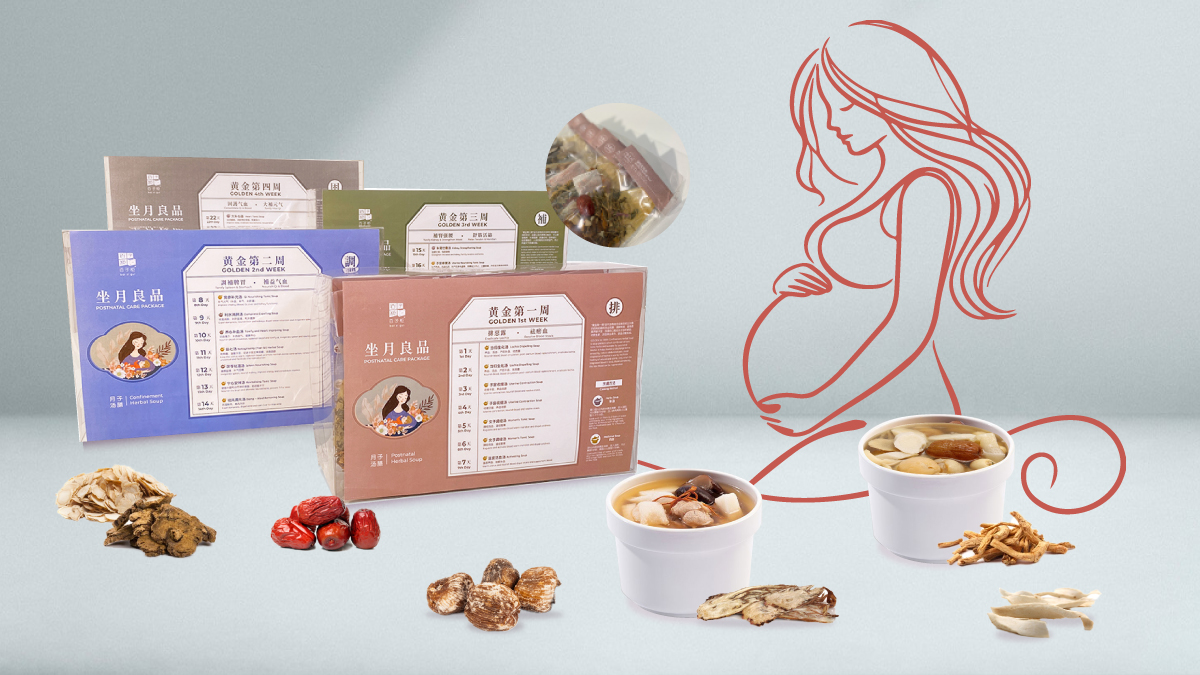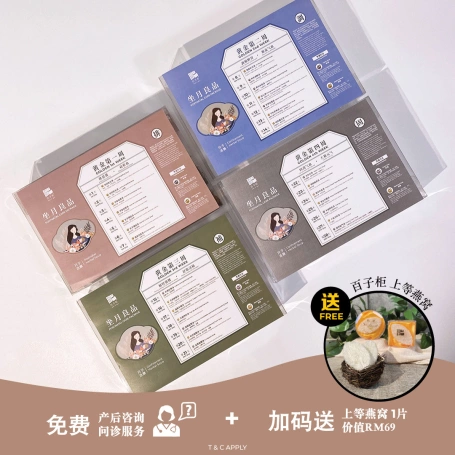Can You Wash Your Hair and Bathe During Confinement? How to Maintain Personal Hygiene

Postpartum recovery is no longer solely reliant on traditional practices. Modern postpartum care emphasizes scientific and personalized approaches. A common concern among new mothers is maintaining cleanliness without compromising health. Additionally, issues like fatigue, weakened immunity, and dampness accumulation are prevalent during confinement. This article explores how to maintain personal hygiene safely and introduces a traditional Chinese medicine (TCM) solution—Baizigui Golden Confinement Herbal Soup—to support recovery.
Traditional Beliefs About Hygiene During Confinement
A. Origins of Traditional Taboos
Historically, it's believed that postpartum women should avoid washing their hair or bathing to prevent "wind-cold" from entering the body, which could lead to chronic ailments. These beliefs stem from past living conditions lacking proper heating and hygiene facilities, where bathing could indeed pose health risks.
B. Modern Medical Perspective
Contemporary medicine advocates for maintaining personal hygiene postpartum to prevent infections. Proper bathing and hair washing, when done correctly, do not inherently cause illness. The key lies in appropriate methods and a conducive environment.
C. Importance of Postpartum Hygiene
Post-delivery, women experience increased sweating and bodily secretions. Neglecting hygiene can lead to bacterial growth and hinder recovery. Maintaining cleanliness promotes physical comfort and psychological well-being.
Proper Hygiene Practices During Confinement
A. Safe Hair Washing Tips
-
Use warm water (37°C–40°C).
-
Dry hair immediately with a towel.
-
Use a hairdryer on a low setting to ensure complete dryness.
-
Avoid drafts during and after washing.
B. Suitable Bathing Methods
| Method | Precautions | Recommendation |
|---|---|---|
| Shower | Use warm water; dry promptly | ★★★★★ |
| Sitz Bath | Ensure water cleanliness | ★★★☆☆ |
| Sponge Bath | Alternative when bathing isn't feasible | ★★★★☆ |
-
Use gentle, non-irritating bathing products.
-
Limit bath time to 5–10 minutes.
-
Wear warm clothing immediately after bathing.
C. Daily Hygiene Recommendations
- Wipe key areas (armpits, perineal region) with warm water daily.
- Change underwear frequently; opt for breathable cotton fabrics.
- Maintain hand and nail hygiene.
Common Misconceptions and Clarifications
Misconception 1: No bathing or hair washing during confinement
Clarification: Proper hygiene practices, when done correctly, do not cause illness. The risk arises from improper methods, such as exposure to cold drafts or not drying thoroughly.
Misconception 2: Avoiding ventilation to prevent "wind-cold"
Clarification: Adequate ventilation reduces bacterial growth. Ensure the room is well-aired without exposing the mother to direct drafts.
Misconception 3: Postpartum hair loss is due to frequent washing
Clarification: Hair loss postpartum is primarily due to hormonal changes, not hair washing frequency.
Misconception 4: Wearing excessive clothing ensures safety
Clarification: Overdressing can lead to overheating and discomfort. Focus on dressing warmly yet comfortably with breathable fabrics.
Misconception 5: Drinking water causes coldness or bloating
Clarification: Adequate hydration is essential for recovery and lactation. Opt for warm water and nourishing drinks like red date or ginger tea.
Preventing Postpartum Chills
A. Post-Bathing Warmth Measures
- Dry off immediately after bathing.
- Wear warm, dry clothing.
- Keep feet warm with socks or slippers.
B. Appropriate Clothing Choices
- Choose soft, warm, breathable cotton garments.
- Avoid tight-fitting or non-breathable materials.
- Ensure clothing is clean and dry.
C. Home Environment Temperature Control
- Maintain indoor temperatures between 22°C–26°C.
- Avoid direct exposure to air conditioning or fans.
- Ensure proper air circulation without drafts.

Recommended Product: Baizigui Golden Confinement Herbal Soup — A Four-Stage TCM Recovery Solution
Postpartum recovery is one of the most critical periods for a woman’s health. Many new mothers struggle with fatigue, low energy, and internal dampness or coldness entering the body during the confinement period.
To address these challenges, Baizigui Golden Confinement Herbal Soup offers a premium Traditional Chinese Medicine (TCM) solution that supports postpartum recovery through a scientifically designed four-stage nourishment process. It is crafted from high-quality Chinese herbs and offers a convenient way for modern mothers to restore their health, vitality, and inner balance.
The Four-Stage Recovery Plan of Baizigui Golden Confinement Herbal Soup
| Recovery Phase | Key Objective | Signature Herbs | Main Benefits |
|---|---|---|---|
| Detoxification Phase | Expel lochia and toxins from the uterus | Angelica, Red Dates | Promote blood circulation, detoxification, and replenish lost blood |
| Regulation Phase | Strengthen digestion and replenish energy | Chinese Yam, Poria | Enhance spleen function, improve nutrient absorption, boost energy levels |
| Nourishment Phase | Support blood flow and bone health | Goji Berries, Black Sesame | Nourish liver and kidneys, strengthen bones, reduce lower back pain |
| Consolidation Phase | Enhance immunity and long-term health | Codonopsis, Astragalus | Strengthen the body’s constitution, replenish Qi and blood, prevent postpartum hair loss |
Why Choose Baizigui Golden Confinement Herbal Soup?
- Scientifically developed based on ancient Chinese medical theories of postpartum care.
- Custom-tailored formula targeting the specific needs of each postpartum recovery stage.
- Convenient to prepare — simply brew and enjoy, making it suitable for modern mothers with limited time.
- Crafted from premium-grade medicinal herbs, ensuring safety and effectiveness.
For more product details or to purchase, visit: Baizigui Golden Confinement Herbal Soup Official Website
Frequently Asked Questions (FAQs)
1. How soon after delivery can I wash my hair or bathe?
Generally, for natural birth, it is safe to wash your hair or bathe 3–5 days postpartum. For cesarean section, wait for about a week or follow your doctor’s advice depending on wound recovery.
2. Should I use warm or cold water for postpartum cleaning?
Always use warm water (37°C–40°C). Cold water can cause blood vessel constriction and increase the risk of chills or discomfort.
3. Do I need special postpartum care products?
Yes, it is recommended to use mild, non-fragrant, antibacterial personal care products that are gentle on the skin and scalp.
4. How can I avoid catching a cold during confinement?
-
Keep the room warm and draft-free.
-
Dry off immediately after washing.
-
Wear warm clothing and socks.
-
Avoid direct exposure to fans or air conditioning.
5. What if I can't take a full bath during confinement?
You can use warm water and a clean towel for sponge baths, focusing on key areas like armpits, back, and private parts to maintain hygiene.
Conclusion
So, can you wash your hair and bathe during the postpartum confinement period? The answer is a definite yes — but with proper care and scientific methods. Modern postpartum care advocates for maintaining personal hygiene while taking appropriate measures to stay warm and prevent illness.
By adopting correct hygiene practices and leveraging Traditional Chinese Medicine solutions like the Baizigui Golden Confinement Herbal Soup — designed with a structured four-stage recovery plan — new mothers can recover comfortably, restore vitality, and enjoy a healthy postpartum journey.
Combining modern healthcare knowledge with traditional wisdom is the true secret to a safe, comfortable, and scientifically sound postpartum recovery.

 Bahasa melayu
Bahasa melayu 中文
中文

























